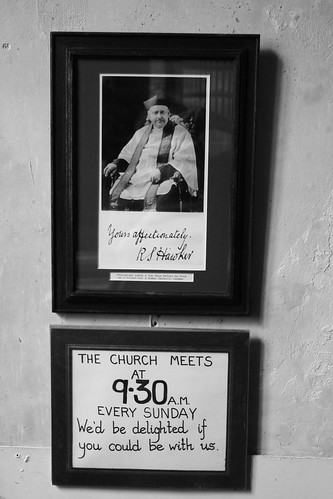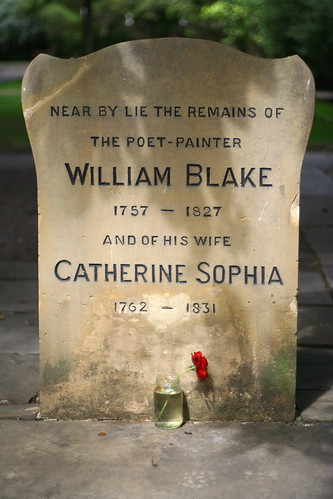Wednesday, August 31, 2005
Hawker
Rev. Hawker, opium smoking poet and vicar of Morwenstow.
Robert Stephen Hawker (1803-1875)
The Song of the Western Men
I.
1 A good sword and a trusty hand!
2 A merry heart and true!
3 King James's men shall understand
4 What Cornish lads can do.
II.
5 And have they fixed the where and when?
6 And shall Trelawny die?
7 Here's twenty thousand Cornish men
8 Will know the reason why!
III.
9 Out spake their captain brave and bold,
10 A merry wight was he:
11 "If London Tower were Michael's hold,
12 We'll set Trelawny free!
IV.
13 "We'll cross the Tamar, land to land,
14 The Severn is no stay, --
15 With `one and all,' and hand in hand,
16 And who shall bid us nay?
V.
17 And when we come to London Wall,
18 A pleasant sight to view,
19 Come forth! Come forth, ye cowards all,
20 Here's men as good as you.
VI.
21 Trelawny he's in keep and hold,
22 Trelawny he may die; --
23 But here's twenty thousand Cornish bold,
24 Will know the reason why!"
Stormy nights, and a sea mountains high, and the thunder on the shore, heard three miles inland -- those are the times when I like to think of Parson Hawker, the Cornish mystic and poet. He was born at Plymouth in 1803, he went to the Grammar School, Cheltenham, and a a boy he was given to practical jokes. There was, for instance, the time when he dressed himself up in sea weed and little else and sat singing on the rocks at Bude and combing his hair. Some of the people of the place thought he was a mermaid. He went to Oxford and at the age of nineteen he married a lady of forty-one. He loved her very much indeed all her life. She died in 1863 aged eighty. 'It will be long before I shall sleep,' he wrote, 'Nearly forty years and never five night away from her. And now I start up to desolation.' But a year later, at the age of sixty, he married a Polish girl of twenty and had two daughters. He died in 1875. For forty years he had been Vicar of Morwenstowe. . . Hawker would sand at his Vicarage door, hand outstretched to welcome, He was large, silver haired, red-faced, excitable, and humorous, with blue eyes. He refused to war black like a clergyman, so he had a plum-colored tailcoat, a fisherman's dark blue Jersey with a red cross embroidered on the side where the centurion's spear pierced our Lord, breeches, and high sea boots made of Hessian. If he had a hat it would be a plum-colored or brown beaver. He did not tolerate fools who came to see him. There is the story of a tourist who said, 'Mr. Hawker, what are your views and opinions?' The Vicar took him to a window in the passage facing the sea. 'There is Hennacliffe, the highest cliff on this coast, on the right; the church on the left; the Atlantic Ocean in the middle. These are my views. My opinions I keep to myself.' But he dearly like a talk with genuine people. Tennyson called once, with his long black hair, Spanish face and cloak. They walked out on to the cliffs, quoting Homer and retranslating him to the thunder of the rollers hundreds of feet below them. From Hawker of Morwenstowe (BBC WESt of England Home Service broadcast 7 October 1945 - abridged version printed in The Listener, 18 October 1945) collected in Coming Home: An Anthology of Prose by John Betjeman (Vintage, London 1998)Morwenstow today is, possibly, even quieter than it was in the days of Hawker. Tourists come in the summer for cream teas, and there's a solid inn where you can get a pint and a meal all year round. The wind howls, the surf roars, surfers have replaced smugglers, and the spooks at GCHQ have taken the place of the revenue men. The church is on the site of an 8th century celtic chapel, which, the leaflet for sale in the church explains, was probably on the site of a pagan religious structure as there is often a remarkable continuity in the places that man chooses to worship.
Tuesday, August 30, 2005
Wiliam Blake
London:
I wander through each chartered street,
Near where the chartered Thames does flow,
And mark in every face I meet
Marks of weakness, marks of woe.
In every cry of every man,
In every infant's cry of fear,
In every voice, in every ban,
The mind-forged manacles I hear.
How the chimney-sweeper's cry
Every blackening church appals;
And the hapless soldier's sigh
Runs in blood down palace walls.
But most through midnight streets I hear
How the youthful harlot's curse
Blasts the new-born infant's tear,
And blights with plagues the marriage hearse.








